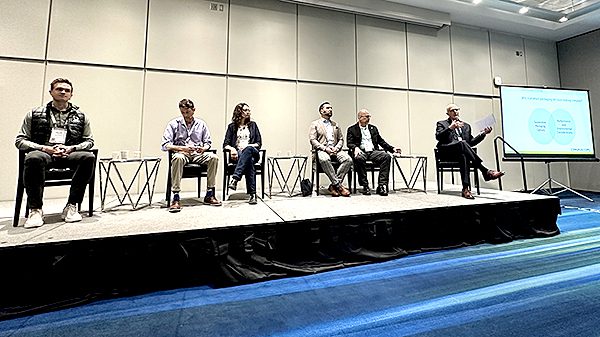TORONTO—The produce industry has a packaging problem. While packaging helps bring a vast array of products to market – from strawberries to salad – we’re unable to find ways to produce and dispose of it in a sustainable manner.
A panel discussed this during the business sessions at the Canadian Produce Marketing Association’s Convention & Trade Show April 26. Panelists represented solutions-based approaches to five key areas of the packaging conundrum:
- Elimination of packaging through shelf-life advancements;
- Reusable packaging;
- Packaging made with recycled content;
- Packaging designed for greater capabilities with recycling; and
- Fully compostable packaging.
One of the most important things to remember, said Crystal Howe, sustainability manager for Ice River Springs, a private-label bottled water maker, is to not dive in all at once.
Ice River Springs wanted to convert its bottles to recycled PET and did it in a dramatic fashion by going 100 percent recycled.
“It got expensive because we entered the market really hard,” she said. “Don’t jump in at 100 percent. Start at 25 percent and slowly start adding product in.”
Also, sourcing food grade recycled PET was a challenge, but there are other places that the food industry can use non-food grade as a step-in to the technology.
“You can use secondary packaging (like wraps and cases) to get some non-food grade materials and support the market while you get to grade,” she said.
The flexible packaging industry’s approach from the beginning has been linear rather than circular, said Leonardo Giglio, CEO at Ontario-based Tempo Flexible Packaging.
“That linear thinking has created a pretty serious problem,” he said. “In a linear economy, we’ve produced these wonderful packages that can go into space and extend the supply chain to do all sorts of great things. But we think there’s an opportunity to be thinking full circle.”
Creating systems that support reuse is challenging in the mainstream market, but works in some closed environments, said Andrew MacDonald, project manager at PAC Global. Projects that work on a smaller scale, in the B2B environment, for example, have a harder time outside of closed environments.
“There are lots of reasons there are not a lot of scale-ups, but one of them is lack of infrastructure,” he said.
Consistent standards also can be a drawback from widespread adoption, said Scott Howarth with Sinclair, a manufacturer of compostable price look up stickers. Plastic PLU stickers have been a hang-up for composting for decades, and solutions exist, he said, but some organizations do not recognize them.
“We need that infrastructure to take these types of materials and be able to accept them,” Howarth said.
Panelists agreed that the industry needs to be motivated to move ahead of regulation.
“I think, you know, our company’s philosophy is try to get ahead of it when we have control,” Giglio said. “So we got out of single use plastic shopping bags 20 years ago, maybe a little too early. But I think while you still have control, that’s the time to make the change, not when you’re forced, it’s going to be far more expensive, and there can be far worse repercussions.”



